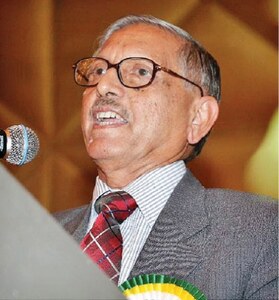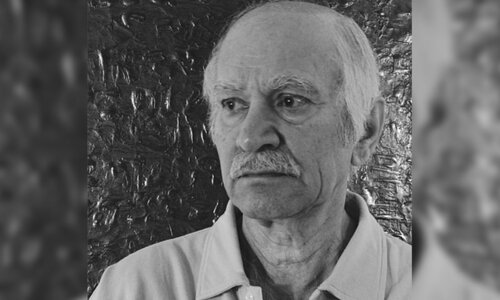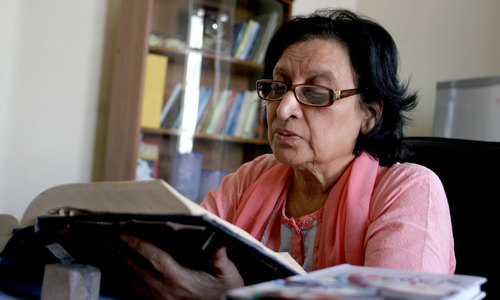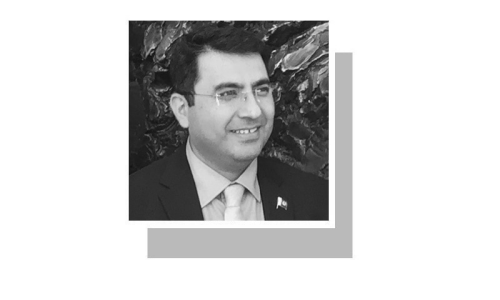Popular Urdu poet and playwright Amjad Islam Amjad died of heart attack on Friday. He was 78.
Born in 1944 in Lahore, Amjad won acclaim as a poet of love and romance. His blank verse had rhythm and flow, interspersed with contemporary diction, but without descending into classicism.
Amjad Islam Amjad developed his own style and took no time in endearing himself to poetry aficionados.
He made a conscious attempt to make Naghmagi (rhythm) an integral part of his verse. The poet himself used to stress that “my readers remember my blank verses due to rhythm rather than the thought in them”.
In his childhood Amjad aspired to becoming a cricketer, but later literature became his passion. His love for literature started during school days when he was made editor of a school magazine.
His family lived on Fleming Road and he did his matriculation from Muslim Model School. After graduation from Lahore’s Islamia College, he chose literature for Master’s degree after getting a scholarship and enrolled in the Oriental College, Punjab University. Amjad became the chief editor of the university’s literary magazine, Mehwar, when he was doing his master’s.
He topped the Punjab University exam and got a gold medal. This distinction got him a teaching job at the MAO College, where he tayght from 1970 to 1975.
He served as deputy director of the Punjab Arts Council for four years from 1975 till 1979 and then as director general of Urdu Science Board in 1997.
At the time of his retirement, he was working as the director of Punjab Textbook Board.
A maestro’s tribute
Munir Niazi was effusive in admiration for Amjad’s collection, Barzakh, published in 1974: “Amjad’s poetry has an ability to move readers with its modern sensibility and melody.”
He said Amjad’s modernism was not simply due to his youth, but owed it to his innate tenderness. “I (Munir) myself carry the same sensibility.”
Amjad wrote in the foreword that the book defined his ideology of poetry, saying that he was wary of both “traditionalists as well as pseudo-revolutionaries”.
He followed the same path in his subsequent works. One should remember that it was the time when both in Pakistan and India left-leaning writers, inspired by Marxism, were on the rise.
He clarified that though his poems reflected his own personal, emotional and political experiences, he was not against subjectivity. He, however, conceded that no writer can attain greatness if he remains indifferent to the aspirations and the angst of his contemporaries.
Aks, his translation of modern Arabic poems published by Masjlis Taraqqi-i-Adab in 1976, included poems by Nizar Qabbani and Mahmoud Darwish.
He also translated poems by black poets from across the world, titled Kalay Logon Ki Roshan Nazmain. The collection carried works by poets from Tanzania, Angola, Mozambique, Ghana, South Africa, Senegal and the USA. It was published in 1980.
His second poetry collection, Satwaan Dar, was published in 1978. In the foreword, he again wrote about his views on poetry and poets.
“Critics have done injustice to poets by labelling them as revolutionary, spiritual, philosophical, psychological or orthodox,” Amjad Islam observed. “To me there are only two types of poets – good poets and bad ones.”
This collection was followed by Fishaar (1982), Barish Ki Awaz (1997), Sahar Aasaar (1998), Phir Yun Huwa (2003), Mohabat Aisa Darya Hai (2004), Yaheen Kaheen (2006) and Hum Uskay Hain, Zara Phir Sey Kehna.
He also published Shehar Dar Shehar, a travelogue, in 1988 about his sojourn to major cities.
Amjad termed himself a socialist-realist writer. He won accolades as a TV playwright as well.
His career started with Ya Naseeb Clinic in 1972. He wrote nine serials, including Samandar, Dehleez and Raat. But the play that made him a household name was Waris. It was telecast from the PTV’s Lahore centre in 1979.
The serial turned out to be a trendsetter in the annals of PTV by faithfully portraying Punjab’s rural life and contrasting it against the educated urban class.
Many singers gave their voice to Amjad’s poems. Some of the famous ones included Mein Teray Sang Kaisay Chaloon Sajna by Noor Jehan, Guzar Gaya Jo Zamana Ussay Bhula He Dou by Hamid Ali Khan, Jo Nah Mil Saka Ussay Bhool Ja by Nusrat Fateh Ali Khan and Bheer Mein Ik Ajnabi Ka Samna Acha Laga by Ghulam Ali.
Amjad wrote columns for newspapers as well after his retirement.
Funeral prayers were offered at Masjid Chowk, near his residence in the DHA and he was laid to rest in Miani Sahib Graveyard.
Amjad Islam Amjad is survived by wife, a son and two daughters.
Published in Dawn, February 11th, 2023
















































Dear visitor, the comments section is undergoing an overhaul and will return soon.